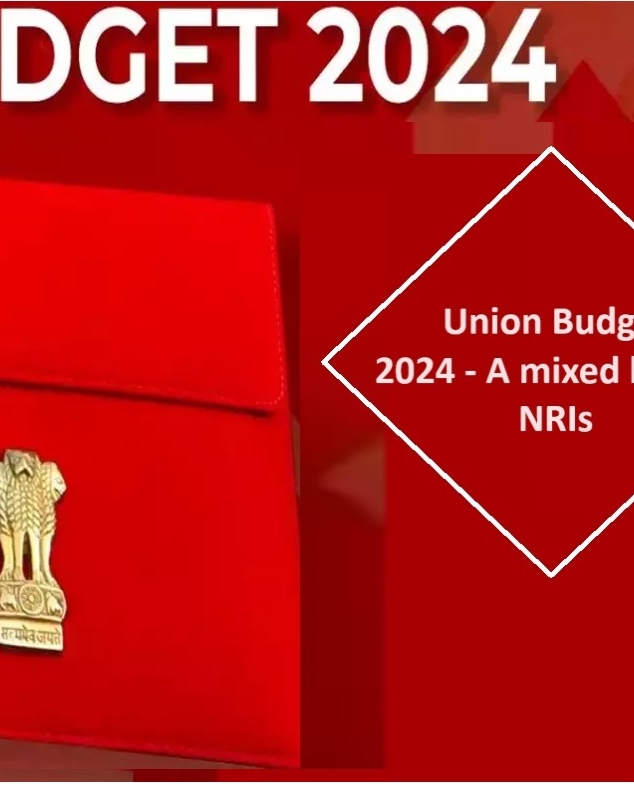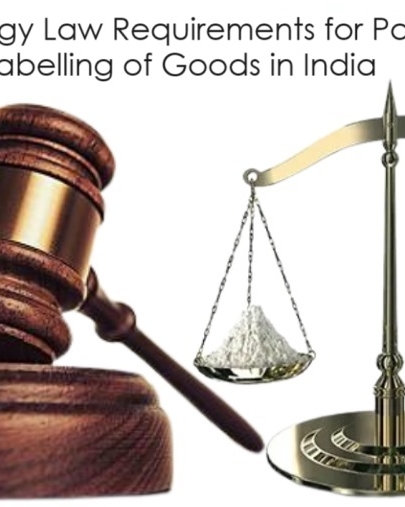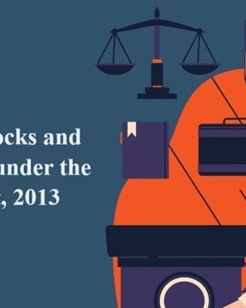Highlights:
Corporate Brief
- MCA notification regarding issuance of Companies (Listing of equity shares in permissible jurisdictions) Rules, 2024
- RBI notification on Credit/Investment Concentration Norms – Credit Risk Transfer.
- RBI notification on guidelines on appointment/ re-appointment of statutory auditors of State Co-operative Banks and Central Co-operative Banks.
- RBI Master Circular on exposure norms and statutory/ other restrictions – Urban Cooperative Banks.
- RBI notification on Second Schedule to the Reserve Bank of India Act, 1934 – Norms for inclusion.
- RBI notification on guidelines on import of gold by Tariff Rate Quota (TRQ) holders under the India-UAE Comprehensive Economic Partnership Agreement (India-UAE CEPA) as notified by the IFSCA (International Financial Services Centres Authority).
- RBI Master Direction on Commercial Paper and Non-Convertible Debentures of original or initial maturity upto one year.
- SEBI Circular on Framework for Short Selling.
- SEBI Circular on Foreign Investment in Alternative Investment Funds (AIFs).
- SEBI Circular on Ease of Doing Investments by Investors- Facility of voluntary freezing/ blocking of Trading Accounts by Clients
- SEBI Circular on Ease of doing business – changes in reporting.
- SEBI Circular on Guidelines for Alternative Investment Funds (AIFs) with respect to holding their investments in dematerialized form and appointment of custodian.
- SEBI Circular on Extension of timeline for verification of market rumours by listed entities.
- SEBI Circular for Streamlining of Regulatory Reporting by Designated Depository Participants (DDPs) and Custodians.
RERA Brief
- Order dated 10.01.2024 numbered 234/U.P.RERA/Admin/2023-24, issued by Uttar Pradesh Real Estate Regulatory Authority (“UP RERA”).
- Office Order dated 18.01.2024 numbered 725 Camp/UPRERA/Admin/2023-24 issued by Uttar Pradesh Real Estate Regulatory Authority (“UP RERA”).
- Circular dated 08.01.2024 numbered 99/RERA/2024/94 issued by Chhattisgarh Real Estate Regulatory Authority (“Chhattisgarh RERA”).
NCLT Brief
- Whether the disqualifications under Section 29A of IBC to submit a Resolution Plan would be applicable on a promoter of a corporate debtor which is a MSME?
Litigation Brief
- Unveiling Legal Nuances – ‘Land’ from ‘Immovable Property’ in the Punjab Pre-emption Act, 1913 differs
- Supreme Court strikes down the Electoral Bonds Scheme as being unconstitutional and manifestly arbitrary.
Corporate Brief
Notification Number G.S.R. 61(E) dated 24.01.2024 issued by Ministry of Corporate Affairs (MCA):
In exercise of the powers conferred by sub-section (3) of section 23 read with section 469 of the Companies Act, 2013 (18 of 2013), the Central Government has issued the Companies (Listing of equity shares in permissible jurisdictions) Rules, 2024.
The provisions of these Rules apply to unlisted public companies and listed public companies which issue their securities for the purposes of listing on permitted stock exchanges in permissible jurisdictions.
The ‘permissible jurisdictions’ as per Rule 2(1)(d) means jurisdiction specified in First Schedule. The First Schedule provides International Financial Services Centre in India as the permissible jurisdiction and permissible stock exchange is India International Exchange, NSE International Exchange.
Notification Number RBI/2023-24/112 and DOR.CRE.REC.70/21.01.003/2023-24 dated 15.01.2024 of the Reserve Bank of India (RBI):
- Credit/Investment Concentration Norms – Credit Risk Transfer.
To ensure uniformity and consistency in computation of concentration norms among NBFCs, a review of the extant concentration norms has been carried out and RBI has decided as under:
- Regulation for NBFC – ML: Currently, credit default swaps are allowed to NBFC as credit risk transfer instruments for offsetting exposure to the underlying counterparty. Henceforth, the exposures of such NBFC shall also be offset with credit risk transfer instruments as listed in the notification. There are also certain exemptions from credit/investment concentration norms.
- Regulation for NBFC – BL: Such NBFCs are now required to place an internal board approved policy for credit/ investment concentration limits for both single borrower/ party and single group of borrower/ parties.
- Regulation for NBFC – UL: It is clarified that to be eligible as a credit risk transfer instrument, guarantees shall be direct, explicit, irrevocable and unconditional.
Notification number DOS.ARG/SEC.8/08.91.001/ 2023-24 dated 15.01.2024 of the Reserve Bank of India (RBI):
- Guidelines on appointment/ re-appointment of statutory auditors of State Co-operative Banks and Central Co-operative Banks.
By virtue of its powers under Section 30 (1A) of the Banking Regulation Act, 1949, the RBI has framed guidelines which shall be applicable to State Co-operative Banks (StCBs) and Central Co-operative Banks (CCBs) for seeking prior approval of RBI for appointment, re-appointment or removal of statutory auditor and other related matters.
These guidelines shall come into effect from April 1, 2024 and accordingly, the StCBs and CCBs shall submit application for prior approval of RBI before July 31 of the particular reference accounting year.
Master Circular Number DOR.CRE.REC.71/07.10.002/ 2023-24 dated 16.01.2024 of the Reserve Bank of India (RBI):
- Exposure norms and statutory/ other restrictions – Urban Cooperative Banks.
The Master Circular consolidates all the instructions and guidelines on the subject issued till date, which includes exposure norms, ceiling to individual/ group borrowers and computation of such ceiling, threshold for value of loans, exposure to housing, real estate and commercial real estate, inter-bank exposure limit, placement/ acceptance of deposits, ceiling on unsecured advance, credit card limits, statutory and regulatory restrictions, granting loan and advances to directors/ relatives, maximum ceiling on advances to nominal members, advances against FDs issued by other banks, bridge loans/ interim finance, loans and advances against shares/ debentures/ bonds, etc.
Notification Number DOR.REG/LIC.No.72/ 16.05.000/2023-24 dated 17.01.2024 of the Reserve Bank of India (RBI):
- Second Schedule to the Reserve Bank of India Act, 1934 – Norms for inclusion.
The Government of India vide its notification F.No. 3/16/2023-AC dated September 04, 2023 (‘Notification’) notified that licensed Teir 3 and Teir 4 Primary (Urban) Cooperative Banks, fulfilling the criteria stipulated for FSWM UCBs by the RBI, subject to maintenance of minimum deposits required for categorisation as Teir 3 UCB for 2 consecutive years, would be eligible financial institution.
By virtue of this Notification, the RBI has decided to revise the eligibility norms for inclusion of Urban Cooperative Banks (UCBs) in the Second Schedule to the Reserve Bank of India Act, 1934 to bring them in conformity with the Revised Regulatory Framework. Further, as per the said notification dated 17.01.2024, the eligible UCBs satisfying the following prescribed criteria shall be considered for inclusion in Second Schedule:
- CRAR of at least 3% more than the minimum CRAR requirement applicable to UCB; and
- No major regulatory and supervisory concerns.
Notification number RBI/2023-24/118 A.P. (DIR Series) Circular No. 14 dated 31.01.2024 of the Reserve Bank of India (RBI):
- Guidelines on import of gold by Tariff Rate Quota (TRQ) holders under the India-UAE Comprehensive Economic Partnership Agreement (India-UAE CEPA) as notified by the IFSCA (International Financial Services Centres Authority).
By virtue of the said Circular, subject to directions as prescribed by RBI, the Authorised Dealer Category-I Banks may allow valid TRQ holders under the India-UAE CEPA to remit advance payment for 11 days for import of gold through IIBX against the TRQ.
Master Direction number RBI/FMRD/2023-24/109 FMRD.DIRD.09/14.02.0001/2023-24 dated 03.01.2024 of the Reserve Bank of India (RBI):
- Reserve Bank of India (Commercial Paper and Non-Convertible Debentures of original or initial maturity upto one year) Directions, 2024.
The Directions on Commercial Paper (CP) and Non-Convertible Debentures (NCD) of original or initial maturity upto 1 year have been reviewed and basis which, RBI has issued the said Master Directions dated 03.01.2024.
The said Master Directions are applicable to all persons/ agencies dealing in CP and NCD of original/ initial maturity upto 1 year and shall come into force from April 01, 2024.
All residents (being ‘Person resident in India’ as under Section 2(v) of Foreign Exchange Management Act, 1999) are eligible to invest in CPs and NCDs and non-residents are eligible to invest to the extent permitted under the FEMA laws. However, no person, resident or non-resident, can invest in CPs and NCDs issued by related parties either in the primary or through the secondary market.
Circular No. SEBI/HO/MRD/MRD-PoD-3/P/CIR/2024/ 1 dated 05.01.2024 of Securities and Exchange Board of India (SEBI):
- Framework for Short Selling.
The said Circular modifies the contents of ‘Annexure 3’ of Chapter 1 of the Master Circular No. SEBI/HO/MRD2/PoD-2/CIR/P/2023/171 dated October 16, 2023 and which are also in line with the provisions of rescinded SEBI Circular No. MRD/DoP/SE/Dep/Cir-14/2007 dated December 20, 2007).
Circular No. SEBI/HO/AFD/PoD1/CIR/2024/2 dated 11.01.2024 of Securities and Exchange Board of India (SEBI):
- Foreign Investment in Alternative Investment Funds (AIFs).
In view of the amendments to the Prevention of Money-Laundering (Maintenance of Records) Rules, 2005, para 4.1.2. under Chapter 4 of SEBI Master Circular No. SEBI/HO/AFD/PoD1/P/CIR/2023/130 dated July 31, 2023 for AIFs stands modified vide the present circular dated 11.01.2024.
In case an investor who has been already on-boarded to scheme of an AIF, does not meet the revised condition, the manager of the AIF shall not drawdown any further capital contribution from such investor for making investment, until the investor meets the said condition.
Circular No. SEBI/HO/MIRSD/PoD-1/P/CIR/2024/4 dated 12.01.2024 of Securities and Exchange Board of India (SEBI):
- Ease of Doing Investments by Investors- Facility of voluntary freezing/ blocking of Trading Accounts by Clients.
It has been decided that the framework for Trading Members to provide the facility of voluntary freezing/blocking the online access of the trading account to their clients on account of suspicious activities shall be laid down on or before April 01, 2024, by the ISF, under the aegis of stock exchanges, in consultation with SEBI and the same shall, inter-alia, contain certain necessary guidelines as specified in the said circular dated 12.01.2024.
Further, the Stock Exchanges shall ensure that the guidelines so issued under the aforesaid Framework are implemented by Trading Members with effect from July 01, 2024. Stock Exchanges shall also put in place an appropriate reporting requirement by Trading Members to enforce the above system. A compliance report to this effect shall be submitted to SEBI by Stock Exchanges latest by August 31, 2024.
Circular SEBI/HO/MIRSD/MIRSD-PoD-1/P/CIR/2024/ 03 dated 12.01.2024 of Securities and Exchange Board of India (SEBI):
- Ease of doing business – changes in reporting.
SEBI had received certain representations from stakeholders citing inefficiencies due to duplication of monitoring mechanisms and difficulties in uploading data to exchanges. In order to address the issue, SEBI advised the industry associations to consult with MIIs under the aegis of Broker’s Industry Standards Forum (ISF) and submit a proposal to SEBI.
These recommendations have been considered by SEBI and as the changes in reports shall continue to allow the stock exchanges and clearing corporations to retain the supervision over client collateral, in order to bring in efficiencies in reporting and a step towards ease of doing business, certain reports are being discontinued.
Circular Number SEBI/HO/AFD/PoD/P/CIR/2024/5 dated 12.01.2024 of the Securities and Exchange Board of India (SEBI):
- Guidelines for Alternative Investment Funds (AIFs) with respect to holding their investments in dematerialized form and appointment of custodian.
In terms of Regulation 15(1)(i)of AIF Regulations, AIFs shall hold their investments in dematerialised form, subject to such conditions as may be specified by the Board from time to time.
This circular provides for the guidelines for AIFs with respect to investments made by them, to be held in dematerialised format and the timelines for the same by which the same may be transferred to such format.
The circular also provides for the appointment of custodian for AIFs and reporting requirements of AIFs under custody.
Circular No.: SEBI/HO/CFD-PoD-2/P/CIR/2024/7 dated 25.01.2024 of the Securities and Exchange Board of India (SEBI):
- Extension of timeline for verification of market rumours by listed entities.
The proviso to Regulation 30(11) of the SEBI (Listing Obligations and Disclosure Requirements) Regulations, 2015 (“LODR Regulations”), inter-alia, requires top 100 listed entities by market capitalization and thereafter the top 250 listed entities by market capitalization to mandatorily verify and confirm, deny or clarify market rumours.
SEBI has extended the timeline for effective date of implementation of the proviso to regulation 30(11) of the LODR Regulations for top 100 listed entities by market capitalization, to June 1, 2024, and for top 250 listed entities by market capitalization, to December 1, 2024.
Circular Number SEBI/HO/AFD-SEC-2/CIR/2024/8 dated 25.01.2024 of Securities and Exchange Board of India (SEBI):
- Circular for Streamlining of Regulatory Reporting by Designated Depository Participants (DDPs) and Custodians
Recently, SEBI reviewed various reports submitted by DDPs and Custodians in order to have uniform compliance standards, for ease of compliance reporting and for regulatory purposes.
The said Circular dated 25.01.2024 provides for reporting requirements to be submitted by DDPs and Custodians on the SEBI Intermediary Portal within specified timelines, i.e. monthly, quarterly, half yearly and annually.
Real Estate Brief
Order dated 10.01.2024 numbered 234/U.P.RERA/Admin/2023-24, issued by Uttar Pradesh Real Estate Regulatory Authority (“UP RERA”)
Vide its order dated 10.01.2024, UP RERA has now instructed the real estate promoters to specifically include 3 (three) email IDs in the application form for project registration, which email IDs are to be used for project related communication with allottees and agents etc. The said order dated 10.01.2024 came in force with immediate effect.
Office Order dated 18.01.2024 numbered 725 Camp/UPRERA/Admin/2023-24 issued by Uttar Pradesh Real Estate Regulatory Authority (“UP RERA”)
Vide office order dated 18.01.2024, UP RERA emphasized the importance of appointing senior officers such as Directors, Managing Directors (MD), Chief Managing Directors (CMD), etc., instead of junior employees of such company to handle project related and other administrative matters which include interalia matters relating to:
- registration, extension, editing of registration details, filing of Quarterly Project Reports (QPR), submission of late fees and penalties;
- signing the documents such as replies of complaints etc. before the honorable benches of UP RERA;
- signing the settlement agreement with the complainant on behalf of such company; and
- for taking crucial decisions and agreements related to real estate projects.
Circular dated 08.01.2024 numbered 99/RERA/2024/94 issued by Chhattisgarh Real Estate Regulatory Authority (“Chhattisgarh RERA”)
To ensure that possession of any real estate project plots/ apartments/ building etc. is delivered to the allottee within a stipulated time and the amount received from allottees is used exclusively for the same project, Chhattisgarh RERA has issued “Chhattisgarh RERA Bank Account Instructions, 2018”. The said Instructions came into force from the date of its issuance i.e., 08.01.2024.
The said Instructions provide general directions stipulating that the account opened by the promoter for an ongoing project in a specified account would be a no-lien account. Withdrawal of amount from this RERA designated account shall be done in accordance with the Real Estate (Regulation and Development) Act, 2016 (“RERA Act”) and rules or regulations made there under and by Chhattisgarh RERA from time to time, as per the instructions issued. The said Instructions also state that only the actual amount spent in the project from the RERA designated account can be withdrawn through the prescribed procedure and that the Advance withdrawal shall not be permitted from these designated accounts.
The said Instructions mandate opening of 3 (three) accounts in a scheduled bank for every real estate project and outline the procedure for deposition in account as well as withdrawals from such accounts. The said Instructions also lay down the manner of reporting to the authority by the promoter, process of changing the RERA designated account and the powers of the Chhattisgarh RERA regarding RERA designated accounts. Additionally, the said Instructions provide necessary instructions for bankers.
For further details regarding the said Instructions, the following link can be referred:
NCLT Brief
Whether the disqualifications under Section 29A of IBC to submit a Resolution Plan would be applicable on a promoter of a corporate debtor which is a MSME?
Introduction
Recently, an appeal was filed by a resolution professional before the Hon’ble Supreme Court challenging the rejection of a resolution plan on the ground that the promoters could not have presented the resolution plan. The first issue that came up for the consideration before the Hon’ble Apex Court was whether resolution applicant who is a promoter of a corporate debtor, which is a Micro, Small and Medium Enterprise (“MSME”) ,was disqualified under the primary conditions outlined in Section 29A of the Insolvency and Bankruptcy Code (“IBC/Code”) to submit a resolution plan.
The second aspect that came up for examination was whether the corporate debtor not having an MSME status at the time of commencement of the Corporate Insolvency Resolution Process (“CIRP”) proceedings would disqualify the resolution applicant under Section 29 A of the Code as the benefit of the provision of the provision of Section 240A of the Code would not be available.
Brief facts of the case
The CIRP proceedings of Shree Aashraya Infra-Con Limited (“Corporate Debtor”) , were initiated and subsequently, Mr. Hari Babu Thota (“Appellant”) was appointed as the Resolution Professional (“RP”). It is relevant to mention that the Corporate Debtor was not a MSME at the time of initiation of the CIRP proceedings and the application for MSME certificate was made after the commencement of CIRP.
The Resolution Plan for resolving the Corporate Debtor was submitted by the promoters which was thereafter, approved by the Committee of Creditors by a majority of 100%. The RP filed the application before the Hon’ble NCLT for the approval of the resolution plan which was rejected on the ground that the promoters are ineligible to present a resolution plan vide Order dated 28.02.2023.
The appeal was preferred by the RP before the National Company Law Appellate Tribunal (“NCLAT”) , in view of the fact that the order by the NCLT could have adverse effect by making him ineligible to continue as an RP or his case to could be referred to Insolvency and Bankruptcy Board of India (“IBBI”) for acting contrary to the provisions of the Code. The Hon’ble NCLAT while relying on its earlier order in the matter of Digambar Anandrao Pingle v. Shrikant Madanlal Zawar [CA(AT)(Ins) 43-43A/2021] , dismissed the appeal by RP and reaffirmed the decision of the Adjudicating Authority. Consequently, the RP filed an appeal before the Hon’ble Supreme Court against the impugned Order dated 02.06.2023 passed by the Hon’ble NCLAT.
Observations by the Hon’ble Supreme Court
Section 29A of IBC
The Supreme Court’s examined the clauses (c), (g), and (h) of Section 29A of IBC which were introduced through amendment in 2018 w.e.f. 06.06.2018. The Court clarified that Section 29A aimed to prevent promoters from submitting a resolution plan and giving undue advantage to them, at whose default the CIRP of the corporate debtor was initiated and further, to restrain the promoters to regain control over insolvent companies, thus safeguarding the interest of the creditors from substantial losses.
While scrutinizing, the clauses of Section 29A of the Code, the Court found that Clause (c) which relates to the lapse of one year from the date of classification of the account of the person as a non-performing asset (“NPA”) did not apply in the instant case due to the absence of classification of account as NPA less than a period of one year. Further, while examining clause (g) of Section 29A , which addresses PUFE transactions, the Court noted that the RP had identified one preferential transaction but no order was passed by the Adjudicating Authority as on the date of impugned order, hence, the aforesaid clause did not apply the facts of the case. Further, the Court observed that Clause (h) which pertains to ineligibility of such person who has executed guarantee in favour of a creditor at whose instance the CIRP of the corporate debtor has been admitted, had no factual application in the present case. The Hon’ble Court observed that the aforementioned three clauses did not disqualify a company’s promoter from presenting a resolution plan.
Section 240A of IBC
Further, the Court analysed the provisions of Section 240A of the Code which pertains to exemption of clauses (c) and (h) of Section 29A in respect of the CIRP of any MSME. The Court highlighted the foundational role of MSMEs in the economy and noted that exclusion of the promoters of the MSMEs from disqualification under Section 29A(c) and (h) was done in view of the fact that MSMEs are foundation of the economy and are key drivers of employment, economic growth and the intent is not to push them into liquidation. The Court analysed the rationale for exclusion of MSMEs from eligibility criteria as laid down under Section 29A (c)and 29A(h) and referred to the Insolvency Law Committee Report of 2018 following which Section 240A has been inserted in the Code which read as follows:-
‘The rationale for this relaxation is that a business of an MSME attracts interest primarily from a promoter of an MSME and may not be of interest to other resolution applicants.’
Further, the Hon’ble Court noted that the date of initiation of CIRP proceedings would not be the relevant date for Section 240A, rather the date of submission of the resolution plan shall be cut off date. The Court, interpreted the ‘notwithstanding clause’ under Section 240A of the Code and clarified that the disqualification applicable to promoters would not extend to MSMEs. The legislative intent is reflected in the statutory provision itself that in Section 29A(c) as it begins with ‘at the time of submission of the resolution plan’.
Conclusion
In view of the above observations, the Hon’ble Court set aside the orders of the Adjudicating Authority and the Hon’ble NCLAT rejecting the resolution plan and allowed the present appeal. Further, the Court restored the matter back to the Adjudicatory Authority for reconsideration.
To sum up, it can be said that the promoters of the MSMEs are under the protection of Section 240A of the Code and further, the date of initiation of CIRP proceedings shall not be construed as the cut-off date, rather the date of submission of resolution plan should be considered as the cut-off date. Therefore, even if the MSME certificate has been obtained at a subsequent date of initiation of the CIRP but before or at the time of submission of the resolution plan, the same would not bar the promoter of the MSMEs to submit the resolution plan.
Case Referred: Hari Babu Thota v. X, [2023 SCC OnLine SC 1642]
Litigation Brief
Unveiling Legal Nuances – ‘Land’ from ‘Immovable Property’ in the Punjab Pre-emption Act, 1913 differs
Case: Jagmohan and Another Versus Badri Nath And Others | Civil Appeal No. of 2024 (Arising out of SLP (C)No.18612 Of 2015)
Forum: Supreme Court of India
Factual Background
- The dispute centres on a notification dated October 10, 1985 issued by the Haryana Government under Section 8(2) of the Punjab Pre-Emption Act, 1913 (“the Act”). The provision enables the State Government to proclaim through notification the absence of pre-emption rights or the imposition of limited pre-emption rights in specific localities, lands, properties, or categories thereof.
- The notification dated October 10, 1985 provides the right of pre-emption not to exist in respect of the sale of land falling in the areas of municipalities in Haryana.
- The owner of the property contended that the tenants could not exercise the right to pre-emption for claiming preferential right on the urban immovable property as the right of pre-emption did not exist for the sale of land falling in the areas of municipalities in Haryana.
- Subsequently, the tenants filed a Pre-emption suit before the Trial Court claiming the preferential right to purchase the property when they came to know that the owner of the property has sold the property to the subsequent owner. The tenants’ claim was based on the fact that they had been in continuous possession of the property since 1949, therefore, they should have the preferential right to purchase the property.
- The trial court decreed the suit in favour of the tenants. The same was upheld by the High Court during the appeal. The subsequent owner preferred a special leave of the Supreme Court, while assailing the order.
Issue dealt in the matter
Whether the exemption of pre-emption as granted vide notification dated 08.10.1985 would be available to the property in dispute.
Decision
- A tenant can claim the right to pre-emption in the ‘Urban Immovable Property’ under the Act, and such a claim cannot be discarded by the subsequent purchaser of property in question on the ground that the notification issued by the State Government bars the tenants right to file a suit for pre-emption for the land situated in the municipal limits.
- The Division Bench noted a difference between the term ‘land‘ and ‘immovable property’. Concurring with the findings of the High Court and the Trial Court, the Apex court observed that the property in possession of the tenant being an urban immoveable property, the right to pre-emption would not be taken away from the tenant based on the notification which limits taking away the right of pre-emption only concerning sale of land falling in the areas of any municipality.
- According to the Apex court, immovable property is more than the land on which certain construction has been made.
- It was held by the bench as under:
“The fact that Section 8(2) of the 1913 Act uses two terms independently, clearly suggests that the land and the immovable property have different meanings….From the aforesaid provisions of the 1913 Act, if read Scheme of the Act, it is abundantly clear that the land and the immovable property are two different terms. The immovable property is more than the land on which certain construction has been made.”
Supreme Court strikes down the Electoral Bonds Scheme as being unconstitutional and manifestly arbitrary
Case referred: Association for Democratic Reforms & Anr. vs Union of India & Ors.
[Writ Petition (C) No. 880 of 2017]
In a landmark judgement delivered on February 15, 2024, the Indian Supreme Court unanimously declared the Electoral Bonds Scheme as unconstitutional. This scheme, implemented in 2018, allowed anonymous donations to political parties through promissory notes resembling bearer bonds purchased from authorized branches of the State Bank of India. However, unlike a promissory note, the electoral bonds do not carry the name of the buyer or payee and the holder of the instrument (i.e. political party) was presumed to be its owner. This facilitated political parties to receive any amount of anonymous donations without divulging the donor’s information. This hampered the voters’ right to information as the information about a political party’s funding is essential for a voter to exercise their freedom to vote in an effective manner.
The Hon’ble Supreme Court struck down the scheme and directed for the sale of electoral bonds to be stopped immediately. The Court also directed the State Bank of India (SBI), to submit details of the Electoral Bonds purchased from 12.04.2019 till date, to the Election Commission of India (ECI). The ECI has to publish the information shared by the SBI on its official website within one week of receipt of the information. Furthermore, electoral bonds that have not been encashed yet have been ordered to be returned.
The enactment of the Electoral Bond Scheme, 2018 was made possible through the amendments introduced by the Finance Act, 2017, to the Representation of the People Act, 1951, the Income Tax Act, 1961, and the Companies Act, 2013. These amendments aimed to facilitate the introduction of the Electoral Bonds Scheme by exempting political parties from mandatorily disclosing political donations received through electoral bonds and removing the requirement for companies to disclose the political party to which they made donations. Before the enactment of the scheme, companies had to be operational for at least three years and could only donate a maximum of 7.5% of their net profits over the past three years. By lifting these requirements, the Scheme opened the doors for setting up of shell companies solely for the purpose of electoral funding and made unlimited corporate funding possible.
The union government defended the anonymity introduced by the scheme by stressing the need for donor anonymity to shield contributors from potential retribution by political entities. The union government also argued that the scheme promoted the use of legitimate funds in political financing, ensuring transactions occurred through regulated banking channels.
The Court rejected these contentions and held that the anonymity promised by the union government through electoral bonds was not “fool-proof”. In fact, the Court stated that the anonymity advertised in the electoral bonds scheme was meant for the public, not for the political party receiving the money. To this effect, the Court observed “The contributor could physically hand over the electoral bond to an office-bearer of the political party or to the legislator belonging to the political party, or it could have been sent to the office of the political party with the name of the contributor, or the contributor could after depositing the electoral bond disclose the particulars of the contribution to a member of the political party for them to cross-verify”.
Ultimately, recognizing the scheme’s detrimental impact on the democratic process and free and fair elections, the Court unanimously declared it unconstitutional.
Disclaimer:
For private circulation to the addressee only and not for re-circulation. Any form of reproduction, dissemination, copying, disclosure, modification, distribution and/ or publication of this Newsletter is strictly prohibited. This Newsletter is not intended to be an advertisement or solicitation. The contents of this Newsletter are solely meant to inform and is not a substitute for legal advice. Legal advice should be obtained based on the specific circumstances of each case, before relying on the contents of this Newsletter or prior to taking any decision based on the information contained in this Newsletter. ZEUS Law disclaims all responsibility and accepts no liability for the consequences of any person acting, or refraining from acting, on such information. If you have received this Newsletter in error, please notify us immediately by telephone.
Copyright © 2014 ZEUS Law. All rights reserved. Replication or redistribution of content, including by caching, framing or similar means, is expressly prohibited without the prior written consent of ZEUS Law.






















